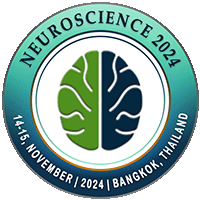
Aleena M Joy
KS Hedge Medical Academy, IndiaTitle: Relationship between prolonged screen time and psychological well-being among older adults: A cross-sectional study in Kerala
Abstract
Introduction: Older individuals increasingly participate actively in screen-based technology as society becomes more digital. Screens have become an essential part of our everyday lives due to the rapid growth of technology, which has revolutionized how we connect with the outside world. Screens are everywhere now, from laptops and televisions to smart phones and tablets, and they even have a place in the life of senior citizens.
Objectives: To determine the relationship between screen time and psychological well-being among older adults.
Materials & methods: We conducted a cross-sectional study among 426 elderly participants aged 60-75 years. Data were collected using a questionnaire by direct interview method. Demographic characteristics, behavioral factors, screen time, and WHO-5 Well-being Index were included. Binary logistic regression was used to analyze the relationship between the associated factors and screen time. The unadjusted and adjusted prevalence ratio and 95% confidence intervals were calculated.
Results: There were 25.4% of participants with prolonged screen time (≥4 hours/day) and 68.5% with poor psychological well-being status, with a mean well-being score of 42.9 ± 17.0. Prolonged screen time was associated with marital status (APR = 2.93, p-value = <0.01) and living arrangements (APR = 0.27, 0.20 & p-value = 0.02, <0.01). There was a negative correlation between age (r-value = -0.10, p-value = 0.03) and psychological well-being (r-value = -0.12, p-value= 0.01) with screen time.
Conclusion: In summary, the study highlights the prevalence of prolonged screen time and poor psychological well-being among the participants. It emphasizes the influence of marital status, living arrangements, age, and their interplay with screen time and psychological well-being. These findings underscore the importance of managing screen time and considering its potential impact on psychological well-being, especially among individuals who are not married and those with specific living arrangements.
Biography
Aleena M Joy has completed her degree in BAMS from Muniyal Institute of Ayurveda Medical Sciences, Manipal. Now she is pursuing her masters in Public Health from the Department of Public Health, K.S. Hegde Medical Academy, NITTE (Deemed to be University), Mangaluru. She completed her thesis on “Screen Time, sleep quality and Psychological Well-being among older adults in a selected rural village of Idukki” in July 2023. Her area of interest is geriatrics, mental health, and child and maternal health. Her specialty is maternal and child health. She pursued her internship at Health Action by People, Trivandrum.

